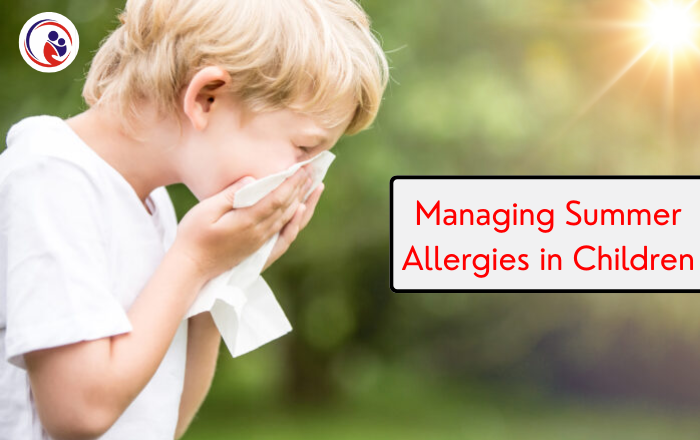Summer is a time for children to enjoy outdoor activities, but for many, it also brings the discomfort of seasonal allergies. If your child experiences sneezing, itchy eyes, or a runny nose during the warmer months, they may be dealing with summer allergies. Understanding the causes, symptoms, and treatment options can help you manage these allergies effectively and ensure your child enjoys the season to the fullest.
What Causes Summer Allergies in Children?
Allergies occur when the immune system overreacts to substances that are normally harmless. During summer, several environmental allergens become more prevalent:
-
Pollen: Grasses, weeds, and certain trees release pollen during late spring and summer. Wind can carry this pollen for miles, making it one of the most common causes of allergic reactions.
-
Dust Mites: Increased indoor time with fans or air conditioning can stir up dust mites, especially in mattresses, carpets, and furniture.
-
Mold Spores: Humidity in summer can promote mold growth in damp areas like bathrooms, basements, and outdoor gardens.
-
Air Pollution: Smog and pollutants from vehicles and construction activities are more concentrated in the heat, which can worsen respiratory allergies.
-
Insect Stings: Bees, wasps, and mosquitoes are more active in summer. Some children may have allergic reactions to insect bites or stings.
-
Chlorine: Swimming pools are a summer favorite, but chlorine used to disinfect water can irritate sensitive skin and respiratory pathways in some children.
Common Symptoms of Summer Allergies
Allergy symptoms can vary from mild to severe. It’s important for parents to recognize these early signs:
-
Sneezing and nasal congestion
-
Runny nose with clear mucus
-
Itchy or watery eyes
-
Coughing, especially at night
-
Wheezing or shortness of breath
-
Skin rashes or hives
-
Fatigue due to disrupted sleep
In some cases, allergies may also trigger asthma symptoms in children, making it harder for them to breathe and causing chest tightness or frequent coughing.
Diagnosis and When to Visit a Pediatrician
If your child exhibits persistent allergy symptoms during the summer, it’s advisable to consult a pediatrician for accurate diagnosis and management. At a reputed Child Care Clinic in Moshi, pediatricians often perform a combination of the following:
-
Medical History Evaluation: Understanding the family history of allergies or asthma.
-
Physical Examination: Looking for signs like nasal inflammation, skin conditions, or chest congestion.
-
Allergy Testing: Skin prick tests or blood tests may be used to determine specific allergens triggering the symptoms.
Early diagnosis can help in tailoring a treatment plan that not only relieves symptoms but also prevents complications.
Treatment Options
Managing summer allergies involves a mix of medication, home remedies, and lifestyle changes:
1. Medications
-
Antihistamines: Help reduce sneezing, itching, and runny nose.
-
Nasal Sprays: Reduce inflammation and congestion in the nasal passages.
-
Decongestants: Useful for short-term relief of stuffy noses.
-
Inhalers: Prescribed for children with allergy-induced asthma.
Always use medications under the guidance of a pediatrician to ensure proper dosage and avoid side effects.
2. Natural Remedies and Lifestyle Adjustments
-
Use air purifiers at home to reduce indoor allergens.
-
Bathe children after outdoor play to wash off pollen.
-
Keep windows closed during high pollen hours (early morning and late afternoon).
-
Dry clothes indoors or use a dryer to prevent pollen from clinging to fabrics.
-
Avoid areas with freshly cut grass or lots of flowering plants.
3. Immunotherapy
In severe or persistent cases, allergen immunotherapy (allergy shots or sublingual tablets) may be recommended. This long-term treatment gradually builds the child’s tolerance to specific allergens.
Prevention Tips for Parents
Preventing allergy flare-ups is possible with a few proactive measures:
-
Monitor pollen counts and limit outdoor play on high-pollen days.
-
Regularly clean air conditioning filters and vacuum with HEPA filters.
-
Encourage children to wear sunglasses and hats outdoors to protect eyes and face from allergens.
-
Keep pets clean, as their fur can carry pollen and dust indoors.
Educating your child about not rubbing their eyes, washing hands frequently, and staying hydrated can also go a long way in minimizing symptoms.
When Allergies Affect Daily Life
If allergies are interfering with your child’s sleep, concentration in school, or ability to participate in daily activities, it’s time to seek specialized help. A trusted Child Care Clinic in Moshi can provide holistic support — from accurate diagnosis to personalized treatment plans — ensuring your child’s health is not compromised by seasonal allergies.
Summer allergies can be a nuisance, but they are manageable with the right approach. Identifying triggers early and taking appropriate action can help your child enjoy a healthy, active, and joyful summer. For concerned parents in and around Moshi, visiting a reliable pediatrician can make all the difference in managing seasonal allergies effectively.
Visit Dr. Kale Clinic – Pediatric Allergy Care
If you’re looking for a pediatrician in Moshi who can guide you through managing seasonal allergies in children, consider visiting Dr. Mandar Kale at Dr. Kale Clinic. Dr. Kale has experience working with children of all ages and can help identify the right treatment approach based on your child’s symptoms.
📍 Dr. Kale Clinic, Moshi – Supporting your child’s health through every season.


